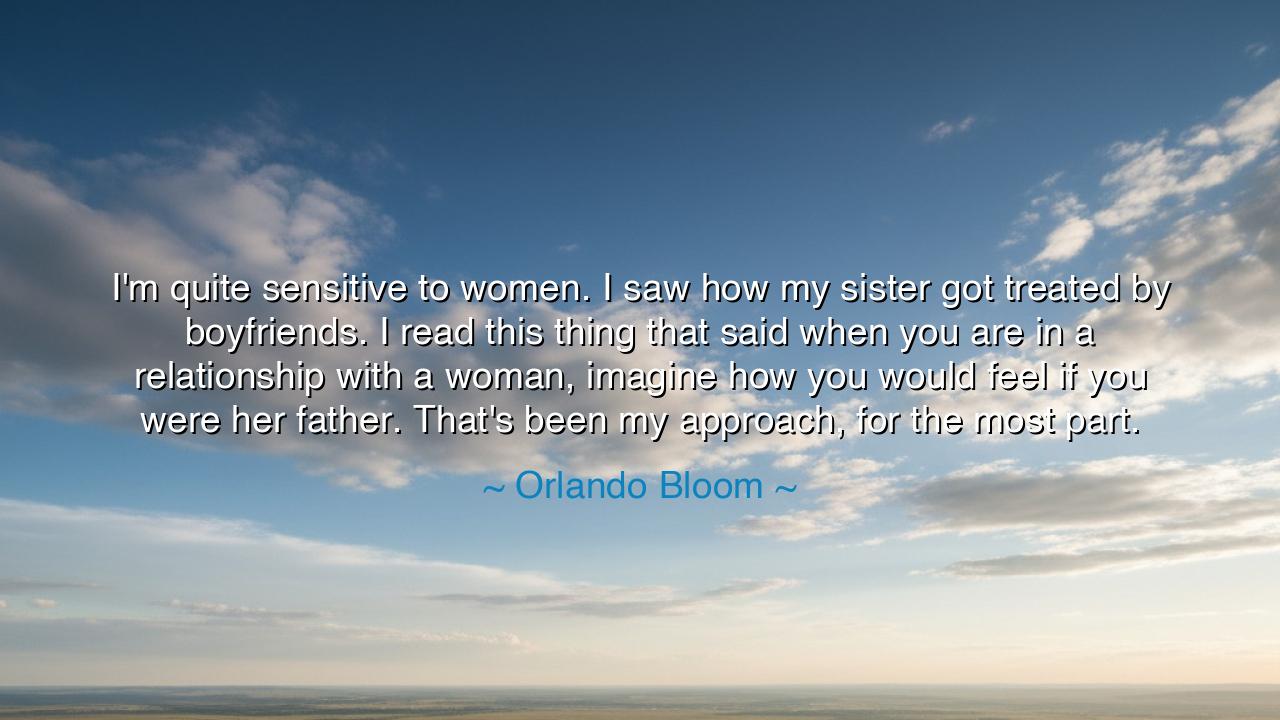
I'm quite sensitive to women. I saw how my sister got treated by
I'm quite sensitive to women. I saw how my sister got treated by boyfriends. I read this thing that said when you are in a relationship with a woman, imagine how you would feel if you were her father. That's been my approach, for the most part.






The actor Orlando Bloom, known for his grace both on and off the stage, once spoke words that rise above fame and performance, reaching instead into the realm of the moral and eternal. He said, “I’m quite sensitive to women. I saw how my sister got treated by boyfriends. I read this thing that said when you are in a relationship with a woman, imagine how you would feel if you were her father. That’s been my approach, for the most part.” Though spoken in the language of our time, these words carry the ancient rhythm of honor, empathy, and sacred respect — virtues that have guided the noble heart since humanity first began to love.
In his reflection, Bloom unveils a truth older than kings: that love is not ownership, nor conquest, but guardianship and reverence. He reminds us that to truly love a woman — or indeed, any soul — one must first imagine her through the eyes of compassion, not desire. To see her as a father sees his daughter is to glimpse her innocence, her strength, her vulnerability, and her immeasurable worth. It is to hold another’s heart as though it were something entrusted by heaven — not to be consumed, but to be cherished.
The ancients spoke of this same reverence through story and myth. In the great epic of The Mahabharata, the warrior Arjuna was taught by Krishna that to act with love and honor is to see the divine within all beings. He was told, “He who looks upon the daughter of another as his own, and upon the wife of another as his sister, walks the path of righteousness.” What Orlando Bloom speaks of is this very teaching — that love must be rooted in empathy, for without empathy, passion turns to pride, and affection becomes control.
We live in an age where love is often mistaken for possession, where men and women too easily forget that affection is not a claim but a covenant. Yet Bloom’s words remind us of a gentler, wiser approach — one born not from romance, but from conscience. He learned sensitivity not through fame or philosophy, but through witnessing pain — seeing his sister wronged and vowing silently never to be the cause of such hurt. From her suffering, he learned compassion; from her dignity, he learned restraint. Thus, even sorrow may become a teacher of virtue when the heart listens.
Consider, too, the story of Marcus Aurelius, emperor of Rome. Though he ruled armies and commanded empires, he wrote in his Meditations that a man’s strength is proved not by domination, but by his capacity for gentleness. “To be good,” he said, “is to be invincible.” So too does Bloom’s philosophy remind us that masculinity is not diminished by tenderness; it is defined by it. The man who can love as a protector, who can care without seeking control, has ascended to the highest form of courage — the courage to honor.
There is also a deeper wisdom in imagining oneself as the father of the one we love. It teaches the heart to love without selfishness, to desire her happiness even beyond our own. It purifies affection of the hunger for possession, transforming it into care. This way of seeing brings balance to relationships — for love that protects, rather than consumes, becomes enduring. It becomes the kind of love that builds rather than burns, that steadies rather than shatters.
Thus, the lesson is clear: let every man — and woman — approach love with reverence. Before words are spoken, before touch is given, pause and ask: “If I were her father, her mother, her child — how would I wish her to be treated?” Let that answer guide your actions. This is not the cold restraint of duty, but the warm discipline of the heart — the wisdom that transforms passion into honor, and love into virtue.
And so, my child of the future, remember what Orlando Bloom teaches by example: love is not a flame to be possessed, but a light to be guarded. Be sensitive, not weak; protective, not possessive. Let your love be both fierce and gentle, for only in that balance will you know the beauty of true affection. In loving others as sacred beings, you will discover your own nobility — and in that discovery, the world itself is made gentler, wiser, and whole.






AAdministratorAdministrator
Welcome, honored guests. Please leave a comment, we will respond soon